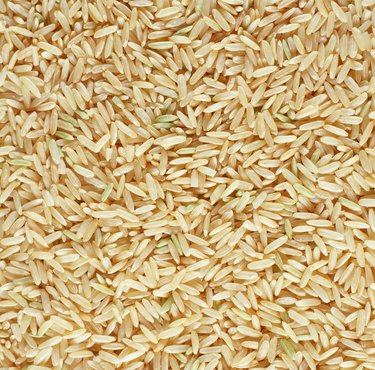
Ingestion of brown rice or its products sometimes causes allergic reactions. This may result from contamination or the inclusion of food additives derived from sources other than rice. For example, babies have suffered allergic reactions when gluten or wheat was included in a brown rice baby food, according to the Canadian Food Inspection Agency. However, even pure brown rice occasionally causes allergic reactions.
Brown Rice Defined
Video of the Day
Both brown rice and white rice are the seeds of Oryza sativa, the rice plant. While white rice contains only the endosperm, or the starchy part, of the rice seed, brown rice consists of the entire rice seed except the hull. This gives brown rice a greater nutritional value, but it also means that brown rice has more components, some of which may be allergenic.
Video of the Day
Prevalence
Brown rice foods rarely cause allergic reactions in the United States or Europe. They are more common in Asia or where rice is a staple food. Since many people cultivate rice in Asia, a considerable number of rice-related allergies result from contact with airborne pollen rather than ingestion, since rice pollen contains an allergen called Ory s 1.
Ingestion and Contact
Sensitive people may suffer an allergic reaction from eating brown rice. However, an allergic reaction may occur even if ingestion has not taken place. Sensitive people have occasionally suffered allergic reactions when handling rice seeds while preparing a meal.
Symptoms
A brown rice allergy may affect the digestive system, resulting in flatulence, diarrhea or a bloated feeling. It may affect the skin, causing a rash or hives. Other symptoms are asthma or inflammation of the nose or eyes. An especially severe case may culminate in anaphylactic shock, which involves symptoms such as depressed blood circulation, respiratory difficulties and fainting. If not treated, death may result.
Allergens
Various proteins are responsible for brown rice allergic reactions. These proteins are classified according to their molecular weight in kilodaltons. A dalton is the weight of one proton, so a kilodalton equals the weight of 1,000 protons. Some brown rice allergens weigh 14 to 16 kilodaltons; others weigh as much as 33 kilodaltons or even 60 kilodaltons, according to "Rice (Oryza sativa)" by Matthias Besler, et al. In addition, brown rice contains lectins, a type of protein that is present in a wide range of foods. Lectins may attach themselves to components of various cells, such as the cells that line the wall of the intestines. This results in a variety of problems, including allergic reactions.
- Allergy Tips: Get to Know the Symptoms and Treatment Options for Rice Allergies
- All Alergy: Rice
- Rice Association: Rice - Nutritional Profile and GI Implications
- Canadian Food Inspection Agency: Allergy Alert
- Food Allergens; Rice (Oryza Sativa); Matthias Besler, et al; 2001
- Krispin's Komments on Nutrition and Health: The Lectin Report
- "Townsend Letter for Doctors"; Dietary Lectins...; Laura Power; 1991
- "Gene";Cloning, Expression and Immunological Characterization...; Huiling Xu, et al; Oct. 1995
- Allergen Nomenclature: Ory s 1
- University of Texas Medical Branch: Allergen Ory s 1